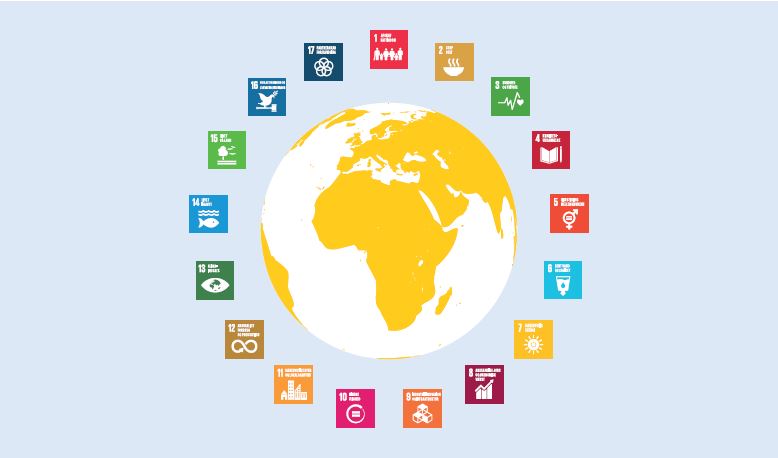With the Sustainable Development Goals (SDGs), sustainable development has become a global agenda with the private sector as a central driving force. Businesses are playing a crucial role in achieving the SDGs. Many companies and investors can contribute with knowledge, technology, innovation, and capital that help solve global challenges. Therefore, The Ministry of Foreign Affairs collaborates with a number of key international actors and partners to foster the role of industry in meeting the SDGs. Through international cooperation and partnerships, we promote the SDGs across countries and sectors.

Examples of international cooperation:
UN Global Compact
Denmark supports UN Global Compact's work to promote corporate responsibility and create a global movement among companies and their partners to meet the SDGs. The Global Compact focuses on the business opportunities that the SDGs entail and promote the ten principles that form the basis of the Global Compact. The principles are based on internationally recognized conventions on human rights, labour rights, environment, and anti-corruption and provide a good starting point for companies to work with CSR and sustainability. Read more here. The Global Compact also has a Danish network.
C40 Cities
Denmark cooperates with C40 Cities and supports the organisation’s work. C40 is an association of the world’s biggest cities that are paving the way for creating climate action and sustainable cities. C40 has over 90 membership cities with a total population of over 650 million residents and makes up around a quarter of the global economy. C40 gives, amongst other things, technical support to their membership cities during the process of preparing climate action plans in line with the Paris Agreement. At the same time, the organisation makes sure that important experiences are shared between the cities. In practical terms, Denmark supports the preparation of climate action plans in five cities: Addis Ababa, Ho Chi Minh City, Jakarta, Qingdao and Wuhan. The action plans identify and prioritise the efforts that contribute the best ways to secure that the cities implement the Paris Agreement’s targets by adjusting sectors such as transport, construction, water and food.
Sustainable Trade Initiative (IDH)
Denmark supports the Sustainable Trade Initiative (IDH), which successfully brings together companies and public partners to address challenges and improve sustainability in all aspects of the company’s supply chain from soil to table. IDH focuses on products like coffee, cocoa, flowers, and cotton produced in developing countries in Africa, Asia and Latin America and traded internationally before reaching consumers in Denmark and the rest of the EU. As something new, the IDH also works in a holistic approach for marginalised landscapes such as the Mau forest in Kenya and Matto Grosso plain in Brazil. All in close cooperation with Danish and multinational companies. Read more here.
World Resources Institute
Denmark cooperates with the green think-tank, World Resources Institute (WRI) that works to promote green transition and sustainable growth to benefit the globe and the world’s populations. WRI’s knowledge-based approach to green transition is an important contribution to reaching the Sustainable Development Goals and the Paris Agreement. On a strong foundation of data and research the WRI works on moving political decisions, business strategies, and civil society action in a more sustainable direction in order to build a bridge between scientific institutions and action in practice. Denmark’s support to WRI focuses on developing countries, especially in Africa.
International Finance Corporation
Denmark cooperates with International Finance Corporation (IFC) on mobilisation of private sector finance for sustainable growth by focusing on innovative business models. Among other things, the cooperation aims at finding new technological solutions that address climate change, especially related to international and national challenges within energy supply, industry and food production. The cooperation also includes possibilities of mobilising funding for small and medium sized enterprises in fragile and conflict-affected countries.
World Economic Forum
As the first country in the world, Denmark has entered into a comprehensive cooperation agreement with the World Economic Forum (WEF) to promote partnerships and progressive social solutions to global challenges in, among other things, climate, gender equality and the labour market.
World Benchmark Alliances
Denmark supports the World Benchmarking Alliance's work to measure and rank major companies' contributions to the SDGs. The initiative will contribute to increased transparency for companies, investors and citizens as well as ensuring competitive incentives to strengthen the private sector's contribution to the SDGs.
